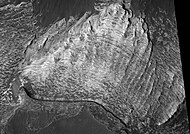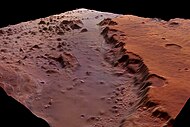Eos Chasma
Eos Chasma’s western floor is mainly composed of an etched massive material composed of either volcanic or eolian deposits later eroded by the Martian wind. The eastern end of the Eos chasma has a large area of streamlined bars and longitudinal striations. This is interpreted to be stream-carved plateau deposits and material transported and deposited by flowing fluid. Ganges Chasma is an offshoot of Eos Chasma. MRO discovered sulfate, hydrated sulfate, and iron oxides in Eos Chasma.
According to an analysis by Vicky Hamilton of the University of Hawaii, Eos Chasma may be the source of the ALH84001 meteorite, which some believe to be evidence of past life on Mars. However, the analysis was not conclusive, in part because it was limited to parts of Mars not obscured by dust.
-
Eos Chaos—lies at southern edge of Eos Chasma, as seen by HiRISE. To see many fine layers click on image.
-
Eos Chasma
See also
References
- ^ Murchie, S. et al. 2009. A synthesis of Martian aqueous mineralogy after 1 Mars year of observations from the Mars Reconnaissance Orbiter. Journal of Geophysical Research: 114.
- ^ McKay, David S.; Gibson Jr., E. K.; et al. (1996). "Search for Past Life on Mars: Possible Relic Biogenic Activity in Martian Meteorite ALH84001". Science. 273 (5277): 924–930.
- ^ Birthplace of famous Mars meteorite pinpointed". New Scientist. Retrieved March 18, 2006.
External links
- Eos Chasma on Google Mars - scrollable map centered on Eos Chasma
- Eos Chasma - photos by the European Space Agency's Mars Express

